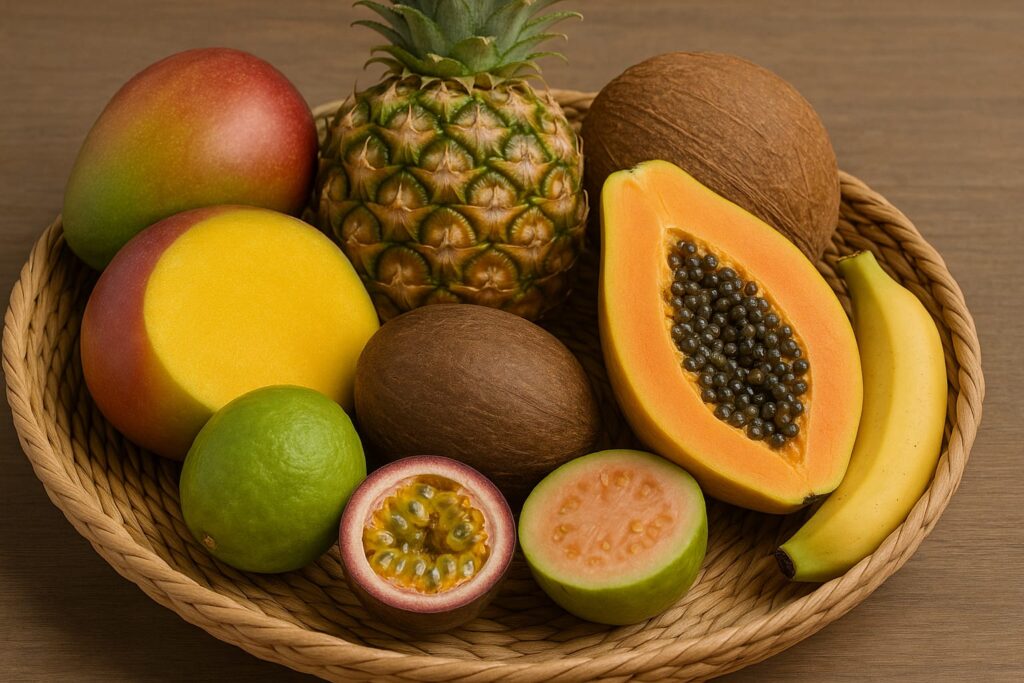Tropical Fruit Benefits and Nutrition Facts
Tropical fruits are not only delicious but also packed with essential nutrients that can boost your health in countless ways. Understanding tropical fruit benefits and nutrition facts can help you make informed dietary choices, improve your well-being, and enjoy the flavors of nature’s sweetest gifts. From mangos to pineapples, these vibrant fruits are loaded with vitamins, minerals, antioxidants, and unique plant compounds that support a healthy lifestyle.

What Makes Tropical Fruits Unique?
Tropical fruits grow in warm, humid climates near the equator, which allows them to develop intense flavors and vibrant colors. Their high sunlight exposure promotes the production of antioxidants like vitamin C and carotenoids, making them nutritional powerhouses. Moreover, tropical fruits often contain unique enzymes, such as bromelain in pineapple or papain in papaya, which support digestion and overall gut health.
Mango: Nutrient-Rich and Flavorful
Mangoes, often called the “king of fruits,” are rich in vitamin C, vitamin A, and fiber. One cup of sliced mango provides more than 60% of your daily vitamin C needs, supporting immune health and skin vitality. Additionally, mangos contain polyphenols that act as antioxidants, helping to combat oxidative stress. Because of their fiber content, they also support healthy digestion and stable blood sugar levels.
You may also be interested in: Mango Benefits and Nutritional Information
Pineapple: A Tangy Source of Enzymes
Pineapple is a tropical fruit beloved for its sweet and tangy flavor. It’s an excellent source of vitamin C and manganese, both of which play a role in antioxidant defense and bone health. Pineapples are unique because they contain bromelain, an enzyme that helps break down proteins and may reduce inflammation. Including pineapple in your diet can improve digestion and potentially speed up recovery after exercise.
You may also be interested in: Pineapple Benefits and Nutrition Facts: Bromelain’s Role in Health
Papaya: Gentle on the Digestive System
Papaya is soft, sweet, and packed with beneficial compounds. It is an outstanding source of vitamin C, folate, and fiber. Papayas also contain papain, an enzyme that aids digestion and may help reduce bloating. The high content of antioxidants like lycopene in papaya supports heart health and may help protect against certain chronic diseases.
You may also be interested in: Papaya Benefits and Nutritional Information: A Complete Guide
Banana: A Potassium Powerhouse
Bananas are one of the most widely consumed tropical fruits worldwide. They are rich in potassium, a mineral essential for maintaining healthy blood pressure and heart function. They also provide vitamin B6, vitamin C, and dietary fiber. Because they are easily digestible, bananas are often recommended for athletes to restore energy quickly and maintain electrolyte balance.
You may also be interested in: Banana Benefits and Nutritional Information: Health Guide
Guava: Packed With Vitamin C
Guava is a tropical fruit with an impressive nutritional profile. It is exceptionally high in vitamin C, containing even more than oranges. Guava is also a great source of fiber, folate, and potassium. Regular consumption of guava can support immune function, aid digestion, and help regulate blood sugar levels. Additionally, guava leaves are often used in herbal teas for digestive support.
You may also be interested in: Guava Benefits and Nutritional Information: A Complete Guide
Passion Fruit: Antioxidant-Rich Delight
Passion fruit is known for its fragrant aroma and tangy flavor. It’s rich in antioxidants such as vitamin C and beta-carotene. Passion fruit seeds contain piceatannol, a compound that may improve insulin sensitivity. Moreover, the fiber in passion fruit promotes a healthy gut microbiome and supports regular bowel movements.
You may also be interested in: Passion Fruit Benefits and Nutrition: The Ultimate Health Guide
Coconut: A Hydrating Superfood
Coconut stands out among tropical fruits because of its healthy fats, particularly medium-chain triglycerides (MCTs). These fats can be quickly converted into energy and may support brain function. Coconut water is naturally hydrating and rich in electrolytes like potassium and magnesium, making it ideal for rehydration after exercise or illness.
You may also be interested in: Coconut Benefits and Nutritional Information
Durian: The King of Energy-Dense Fruits
Durian is often called the “king of fruits” in Southeast Asia, known for its strong aroma and creamy texture. It’s rich in healthy fats, fiber, and vitamins like B1, B6, and C. Durian also contains tryptophan, an amino acid that promotes better sleep and mood regulation. Although high in calories, it offers a dense source of energy and nutrients.
You may also be interested in: Durian Benefits and Nutritional Information: The Complete Guide
Key Tropical Fruit Benefits and Nutrition Facts for Health
Eating tropical fruits regularly can have numerous health benefits. They help strengthen the immune system, improve skin health, enhance digestion, and support heart health. Many tropical fruits are low in calories yet high in fiber, which can aid in weight management. Because they are naturally sweet, they can also replace less healthy desserts and snacks, making it easier to maintain a balanced diet.
Tropical Fruit Benefits and Nutrition Facts: Nutritional Guidelines
While tropical fruits are generally healthy, they do contain natural sugars. Therefore, portion control is important, especially for individuals managing blood sugar levels. Combining fruits with protein or healthy fats can help slow the absorption of sugars and prevent blood sugar spikes. It’s also worth noting that fresh fruits typically offer more nutrients and fewer calories than processed or canned varieties.
Ways to Add More Tropical Fruits to Your Diet
Incorporating tropical fruits into your meals is easier than you think. You can add them to smoothies, fruit salads, yogurt bowls, or even savory dishes like grilled pineapple with chicken. Tropical fruits also pair well with nuts, seeds, and leafy greens for nutrient-dense snacks. For variety, try freezing pieces of mango or pineapple for refreshing summer treats.
Tropical Fruit Benefits and Nutrition Facts: Storage and Selection Tips
When choosing tropical fruits, look for vibrant colors, a pleasant aroma, and a firm but slightly yielding texture. Some fruits, like mangoes and bananas, ripen after being picked, so buying them slightly underripe allows you to enjoy them at peak flavor later. Store most tropical fruits at room temperature until ripe, then refrigerate to extend freshness.
Tropical Fruit Benefits and Nutrition Facts: Possible Risks
Although tropical fruits offer numerous benefits, it’s important to consider potential allergies and interactions. For example, some people may experience latex-fruit syndrome with bananas, papayas, or avocados. Pineapple’s bromelain may interact with certain medications, such as blood thinners. Consulting a healthcare professional before making major dietary changes is always wise.
Tropical Fruit Benefits and Nutrition Facts: Sustainability Matters
Choosing sustainably sourced tropical fruits supports both your health and the environment. Look for organic options to reduce pesticide exposure and fair-trade labels to ensure ethical farming practices. Whenever possible, buy locally grown tropical fruits to reduce transportation emissions and support regional farmers.
Conclusion: Why Tropical Fruit Benefits and Nutrition Facts Matter
By understanding tropical fruit benefits and nutrition facts, you can make choices that enhance your health and delight your taste buds. From boosting your immune system to improving digestion, these fruits offer an incredible range of benefits in every bite. Including a variety of tropical fruits in your diet is a delicious way to ensure you get a broad spectrum of nutrients, antioxidants, and plant compounds that support lifelong well-being.
